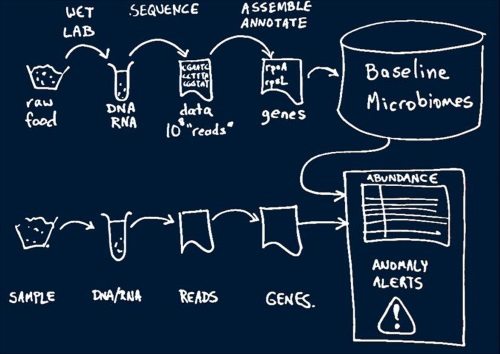Scientists from IBM Research and Mars, Incorporated have established the Consortium for Sequencing the Food Supply Chain, a collaborative food safety platform that will leverage advances in genomics to further one’s understanding of what makes food safe.
Protecting the global food supply is a monumental public health challenge.
In the US, one in six people are affected by food-borne diseases each year, resulting in 128,000 hospitalizations, 3,000 deaths, and US$9 billion in medical costs.
Another US$75 billion worth of contaminated food is recalled and discarded annually.
As the food supply chain becomes more global and complex, new, innovative approaches that use genetic data to better understand and improve food safety are emerging, holding the promise of unparalleled insight and understanding of the total supply chain.
In support of this goal, the consortium will conduct the largest-ever metagenomics study to categorize and understand micro-organisms and the factors that influence their activity in a normal, safe factory environment.
This work could be extended into the larger context of the food supply chain – from farm to fork – and lead to new insights into how microorganisms interact within a factory ecology and be better controlled by new data and science-driven practices.
As a first step, the consortium’s scientists will investigate the genetic fingerprints of living organisms such as bacteria, fungi, or viruses and how they grow in different environments, including countertops, factories, and raw materials.
This data will be used to further investigate how bacteria interact, which could result in completely new ways to view supply chain food safety management.
“The Consortium for Sequencing the Food Supply Chain has the potential to revolutionize food safety, providing a powerful tool to identify and address new threats on an unprecedented scale, enabling critical breakthroughs in global food safety,” said Dave Crean, VP, corporate research and development, Mars, Incorporated.
“We are excited to be working with IBM Research on this, and look forward to welcoming additional partners in the future to help drive global innovation in genomics, food, and agriculture.”
While many food companies such as Mars already have rigorous processes in place to ensure food safety risks are managed appropriately, this pioneering application of genomics will enable an in-depth understanding and categorization of micro-organisms on a much bigger scale than has previously been possible.
“Genome sequencing serves as a new kind of microscope – one that uses data to peer deeply into our natural environment to uncover insights that were previously unknowable,” said Jeff Welser, VP and lab director, IBM Research – Almaden.
“By mining insights from genomic data, we’re seeking to understand how to identify, interpret and ultimately create healthy and protective microbial management systems within the food supply chain.”
The consortium’s research will initially focus on select raw materials and factory environments but will ultimately extend up and down the entire food supply chain and include applications for farmers.
Understanding soil microorganisms, for example, will be crucial to helping farmers learn how to protect their plants from pathogens while ensuring healthy growth and nutrient uptake.
The first data samples will be gathered at Mars-owned production facilities, while IBM’s genomics, healthcare and analytics experts will utilize IBM’s Accelerated Discovery THINKLab, a collaborative research environment, for the large-scale computational and data requirements of this initiative.
Beyond the research, data and findings will be presented in a systematic way to enable affordable and widespread use of these testing techniques.
As the food supply chain becomes more global and complex, better approaches to ensuring safe food are needed, this consortium aims to take food safety to a new level through unparalleled insight and understanding of the total supply chain.
The consortium will be adding additional members from academia, industry and government.










